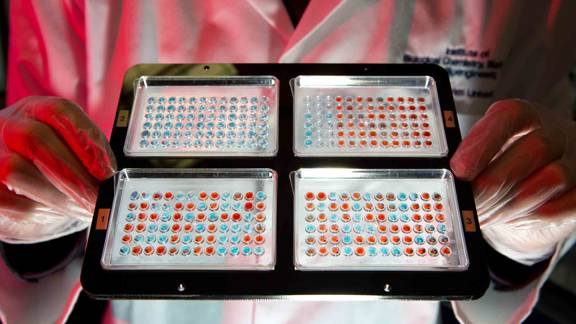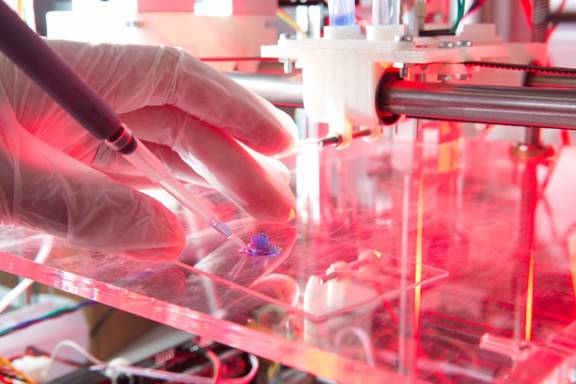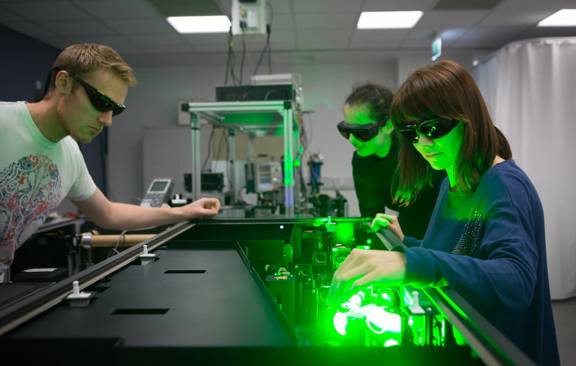How Scotland is helping the world manage diabetes
13 Nov 2019 • 6 minute read
Some of the world’s most important research into diabetes is being carried out in Scotland

Scotland is a world leader in helping diabetics manage their condition. We have companies involved in every area of diabetes management. From Lifescan in Inverness, to Dexcom in Edinburgh, companies in Scotland are continually pushing the boundaries of what is possible.
What is diabetes?
Around 400,000 people in the UK have type 1 diabetes. Which means their pancreas doesn’t deliver insulin and they need to regulate their blood-sugar levels with insulin injections or with an insulin pump.
How Scotland is helping
Scotland continues to be the UK’s most attractive location for foreign direct investment outside London. From traditional industries to the latest in digital and tech, Scotland’s people have the skills you need.
We have some of the finest universities in the world and the research they’re carrying out in life sciences and medical technology sets us apart as global leaders. Scotland has a great track record of turning research findings into businesses. So much so that more companies are formed based on university research here than in any part of the UK.

Innovation across Scotland
Inverness Medical launched in 1995 to design and manufacture glucose test strips and design electronic meters. In 2001, Johnson & Johnson saw their potential and acquired the company, forming Lifescan.
In 2012, an investment deal to make Lifescan’s Inverness base their world centre for R&D included £2.8m from Highlands and Islands Enterprise. At the time, Lifescan said: “It will allow us to get innovation to the marketplace sooner and also contribute further to the prosperity of the Highlands.”
Since then they’ve continued to invest in research and have developed a number of new products to help diabetics manage their condition.
In 2018, Platinum Equity acquired Lifescan from Johnson & Johnson for 2.1 billion USD (£1.6 billion).
Where the world comes to innovate
Another major player in diabetes management is Dexcom. Founded in 1999, they’ve become a leader in continuous glucose monitoring (CGM) technology.
In 2016 Dexcom decided that Edinburgh was the ideal place to base its EMEA headquarters, the perfect platform to build their continuous glucose monitoring business.
With its strong history of medical innovation, the incredible talent pool in the city, and supportive business environment, Edinburgh really stood out to us as a location for Dexcom.
422 million reasons to find a cure
There are a number of unique research trials being carried out in Scotland. Each of these will contribute to the world’s understanding of the condition and seeks to provide new ways of managing it.
It is estimated that there are now 422 million people worldwide living with type 1 diabetes. The ultimate aim of companies working in diabetes is to develop a ‘cure’.
Until then, there are opportunities to develop and refine products to help diabetics live as full and normal a life as possible.

Leading the way in diabetes research
Some of the world’s most important research into diabetes is being carried out in Scotland. These projects include a number that are looking at new ways to manage and control blood glucose levels.
World-leading test to improve diagnosis
Scotland is the first country in the world to roll out a simple blood test for people with Type 1 diabetes enabling some patients to stop taking insulin.
Aimed to improve the accuracy of diagnosis of Type 1 diabetes, the routine testing of C-peptide allows doctors to work out how much insulin someone with diabetes is making themselves.
The roll-out follows a two year pilot study in NHS Lothian led by Diabetes and Endocrinology Consultant Professor Mark Strachan.
Find out more about the study on gov.scotopens in a new window
Exploring blood glucose control in Type 1 diabetes
Research at the University of Edinburgh led by Professor Helen Colhoun is examining how blood glucose control in Type 1 diabetes changes over time in different groups of people. This project aims to find ways to improve how people with Type 1 diabetes manage their blood glucose levels.
Learn more about blood glucose control on diabetes.orgopens in a new window
Exercise regime to bring back hypo awareness
Over time, some people with Type 1 diabetes lose the ability to tell when their blood glucose levels are going too low. This study also led by Professor Helen Colhoun at the University of Edinburgh looks at whether short bursts of high-intensity exercise can help improve awareness of very low blood glucose levels.
Research tackling diabetes in Scotland and India
Scotland and India are working on a huge £7 million project led by genomics specialist, Professor Colin Palmer at the University of Dundee. The collaboration is using the Scottish SHARE database to study genetic susceptibility of diabetes in India. It underlines Scotland’s expertise in this area and our ability to work with other nations in combatting this disease.
The project aims to compare the problems both countries face in combating Type 2 diabetes and improving the care that people with diabetes receive, reducing health inequalities in India and Scotland.
Read more about this collaboration on diabetes.orgopens in a new window
The research to date as helped identify distinct forms of Type 2 diabetes in South Asians, a development with important implications for prognosis and management of the disease.
Read the study findings on the University of Dundee websiteopens in a new window
Scotland and Malaysia partner on major diabetes study
Scotland is bringing its expertise in diabetes, precision medicine and machine learning to bear on a project aiming to improve the outcomes for people with diabetes in Malaysia.
The University of Dundee is partnering with the Malaysia-based UKM Medical Molecular Biology Institute (UMBI) on the £500,000 PRIME project.
"The overarching aim of PRIME project is to build a high-performing partnership that will deliver precision medicine in terms of efficacy and safety for people with diabetes in Malaysia," said Professor Chim Lang, co-lead of the project in Dundee. "By doing so, we can identify the processes that drive the onset of the disease and the cardiovascular complications in Malaysian populations to understand how best to manage diabetes there."
Read more about the PRIME project on the University of Dundee websiteopens in a new window
Data-driven solutions for at-home care
Scottish company MyWay Digital Health (MWDH) delivers transformative care through affordable, evidence-based, data-driven, scalable award-winning solutions specialising in diabetes and long-term conditions. It provides tailored knowledge, advice and data predictions to patients, and health care professionals - improving care, saving lives and saving money.
MWDH runs national and large regional integrated platforms for clinicians and patients, supporting through data-driven automated advice, analytics, and education.
MyDiabetesMyWay (MDMW), its flagship product, developed with NHS Scotland, is the only self-management platform globally to be scaled across an entire country, Scotland.
MyWay Diabetes platform has been assessed as the top app to use in clinical practice, according to a report published by ORCHA in collaboration with the Association of UK Dietitians (BDA).
The company has sealed a key partnership with Pulse Active Station supporting diabetes care in India.
Learn more on the MyWay Digital Health websiteopens in a new window
You might also be interested in
-
Health and life sciences industries
Scotland has one of the largest life sciences clusters in Europe with the networks, support and skills you need to succeed.
-
Explore Scotland's digital health and care sector
Scottish digital health and care companies are the natural choice to help you develop your digital health solution.
-
Scottish digital health and wellness tech companies
Scotland’s smartest healthtech companies are rising to the challenge, supporting global healthcare providers, and improving patients' lives worldwide.
Contact us
If you have any questions or want to talk with one of our advisers, we're always ready to help.
